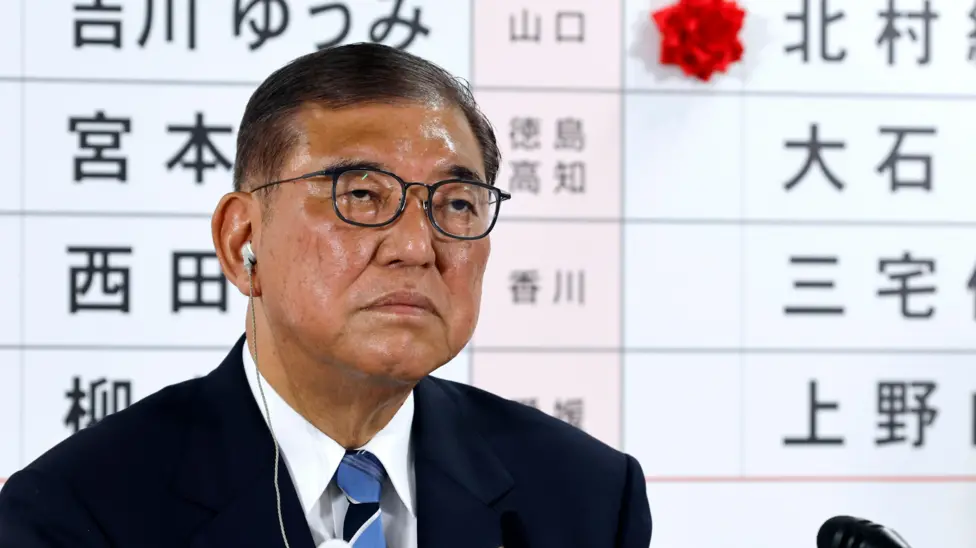Tokyo — Japan’s Prime Minister Shigeru Ishiba has vowed to remain in office despite suffering a significant electoral setback that saw his ruling coalition lose its majority in the nation’s upper house. The defeat has triggered political uncertainty and raised questions about the future direction of Japan’s leadership amid economic woes, public dissatisfaction, and the growing influence of far-right movements.
On Sunday, Japanese voters went to the polls for a tightly contested election for half of the 248 seats in the upper chamber. Ishiba’s ruling coalition, comprising the Liberal Democratic Party (LDP) and its junior partner Komeito, managed to secure only 47 seats—three short of the 50 required to maintain a majority. The Constitutional Democratic Party, the main opposition force, won 22 seats, further reflecting the public’s discontent with the current government.
Speaking to the press shortly after polls closed, Prime Minister Ishiba acknowledged the gravity of the results. “I solemnly accept this harsh result,” he said, adding that he intends to focus on critical trade negotiations with the United States. Despite the loss, Ishiba maintained that stepping down was not an option at this juncture, suggesting that the government still had key responsibilities to address.
However, the electoral outcome is being seen as a major blow to Ishiba’s authority. Having already lost its majority in the more powerful lower house last year, the coalition’s reduced control in the upper house further erodes its legislative influence. Analysts believe this could significantly impact its ability to push through policy reforms and navigate ongoing economic challenges.
The election also underscored a broader shift in Japan’s political landscape. According to Jeffrey Hall, a lecturer in Japanese Studies at Kanda University, support for more right-wing parties has begun to fragment the conservative base that traditionally supports the LDP. “Prime Minister Ishiba is considered not conservative enough by many supporters of former Prime Minister Shinzo Abe,” Hall noted. “They think he doesn’t hold strong nationalist views, particularly on issues like China and historical revisionism.”
Read Also:
Japan PM Ishiba considers trade talks with Trump ahead of G7 summit
Japan executes ;Twitter killer; for murder of 9 victims
Snake causes major disruption on Japans Tokaido Shinkansen line
The Sanseito party, a small but rapidly rising far-right faction, capitalized on this conservative dissatisfaction. Known for its staunchly nationalist, anti-immigration platform and conspiracy-laden rhetoric, Sanseito surged from just one seat in the last election to 14 seats this year. The party gained popularity during the pandemic by promoting controversial views, including opposition to vaccines and mask mandates, and espousing theories involving the “deep state.”
Sanseito’s rise is being interpreted as a reflection of a growing nationalist sentiment in Japan, fueled by economic anxiety, an aging population, and concerns over immigration. While Japan has traditionally maintained strict immigration controls, a recent surge in both foreign residents and tourists has intensified public fears about cultural dilution, job competition, and rising living costs.
In response, Prime Minister Ishiba launched a new government task force last week aimed at addressing “crimes and nuisance behaviors” by foreign nationals, including issues related to land ownership and unpaid social insurance. Critics, however, argue that this move may further inflame xenophobic sentiments and distract from deeper structural issues affecting the economy and public welfare.
Adding to Ishiba’s political troubles is the historical precedent. The last three LDP prime ministers who lost their upper house majority resigned within two months of their electoral defeats. As a result, speculation is mounting over potential challengers within the party. Notable names include Sanae Takaichi, who placed second in last year’s leadership race; Takayuki Kobayashi, a former economic security minister; and Shinjiro Koizumi, son of former Prime Minister Junichiro Koizumi.
Despite the instability, financial markets remained relatively calm. The Tokyo Stock Exchange was closed for a public holiday on Monday, but the yen strengthened slightly against major currencies, suggesting that investors had anticipated the election results.
As Japan faces mounting domestic and geopolitical challenges, including its evolving relationship with the United States and China, the political future of Shigeru Ishiba remains uncertain. While he has vowed to stay the course, the pressure from within his party and the electorate may ultimately force a reckoning sooner than expected.



